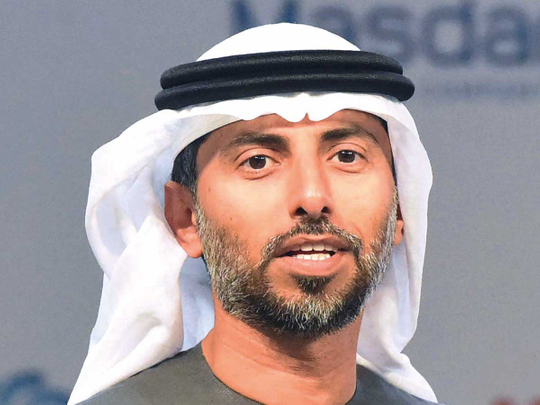
Abu Dhabi: UAE Minister of Energy and Industry Suhail Al Mazroui on Tuesday underscored the importance of oil market stability and said it would encourage and attract investment needed to boost output capacity to meet increasing demand for oil.
Abu Dhabi is currently investing heavily to raise oil production capacity to 4 million barrels a day by the end of 2020 and 5 million barrels per day by 2030 as part of a $132 billion (Dh485 billion) plan. The UAE’s oil production is about 3 million barrels per day at the moment.
In a statement to Wam following a key meeting of Opec and non-Opec members (Joint Ministerial Monitoring Committee) in Jeddah during the weekend, Al Mazroui said Declaration of Cooperation, (output cut deal) played a critical role in the oil market recovery in the first quarter of 2019 compared to the fourth quarter of 2018.
The UAE Energy Minister also said conformity for the month of April 2019 to the ‘Declaration of Cooperation’ was 168 per cent, the highest since the voluntary production adjustments by Organisation of the Petroleum Exporting Countries and non-Opec participating countries began in 2017.
Opec and non-Opec members are cutting production by 1.2 million barrels per day to rebalance oil markets. The agreement is being implemented for six months from January 1 this year. Oil producing countries will meet in June in Vienna to decide whether to extend the deal for the rest of the year.
The 15th JMMC Meeting is scheduled to take place in June 2019 at the Opec Secretariat in Vienna, Austria and oil producers are studying oil inventory projections for an appropriate action for second half of 2019, according to Al Mazroui.
The comments come as Brent trades higher at $72 per barrel due to tensions in the Middle East following attacks on Saudi Arabia’s oil installation as well as oil tankers off the coast of the UAE last week. Reintroduction of sanctions on Iran is also helping oil prices move higher.
“The biggest threat that could trigger a spike is not from the Middle East but the Mediterranean where an escalation of the current unrest in Libya carries the risk of hurting production which have grown rapidly in recent years,” Ole Hansen, head of commodity strategy at Saxo Bank said ruling out any armed conflict in the Middle East following the attack on Saudi oil infrastructure.
He sees Brent to trade between 75 and 80 barring any major geopolitical event in the Middle East.












